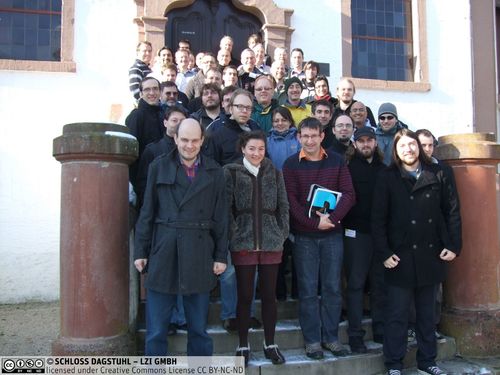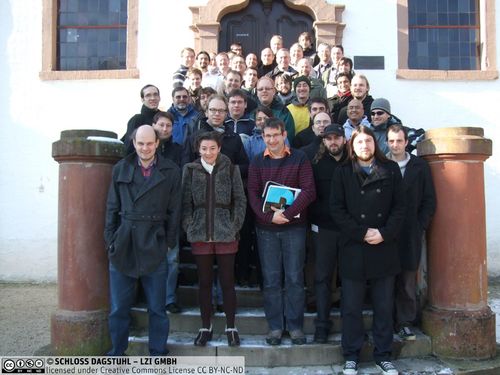Dagstuhl-Seminar 12051
Analysis of Executables: Benefits and Challenges
( 29. Jan – 03. Feb, 2012 )
Permalink
Organisatoren
- Andy M. King (University of Kent, GB)
- Alan Mycroft (University of Cambridge, GB)
- Thomas W. Reps (University of Wisconsin - Madison, US)
- Axel Simon (TU München, DE)
Koordinator
- Andrea Flexeder (TWT GmbH, DE)
Kontakt
- Andreas Dolzmann (für wissenschaftliche Fragen)
- Susanne Bach-Bernhard (für administrative Fragen)
The analysis of executables is concerned with extracting information from a binary program typically, though not exclusively, with program analysis techniques based on abstract interpretation. This topic has risen to prominence due to the need to audit code, developed by third parties for which the source is unavailable. Moreover, compilers are themselves a source of bugs, hence the need to scrutinise and systematically examine executables.
The theme of the analysis of executables is an umbrella term adopted for this seminar, covers, among other things, the following topics:
- specifying the semantics of native instructions, intermediate languages and the synthesis of transfer functions from blocks of instructions;
- abstract domains for binary analysis and how to combine them; type synthesis;
- control-flow graph (CFG) reconstruction, which is a prerequisite for many program analysis, and CFG matching, which is useful for detecting piracy;
- self-modifying code, characterising its semantics and detecting malware.
In all, 42 researchers, both senior and more junior, from 10 countries attended the meeting. This high number shows the strong interest in this emerging field. The feedback from the participants was also very positive.
Thus, one of the tangible outcomes is that the community set out to create a common piece of infrastructure. Beyond this, it was agreed that another seminar about the analysis of executables in two years time would be most welcome. We discussed what topics this new seminar should focus on and we distilled that malware, obfuscation, interpreters and self-modifying code should be major topics, as these constitute challenges that the community needs to address.
- Gogul Balakrishnan (NEC Laboratories America, Inc. - Princeton, US) [dblp]
- Sébastien Bardin (CEA - Gif sur Yvette, FR) [dblp]
- Edward Barrett (University of Kent, GB) [dblp]
- Sebastian Biallas (RWTH Aachen, DE)
- Jörg Brauer (RWTH Aachen, DE) [dblp]
- Doina Bucur (INCAS3, NL)
- Mihai Christodorescu (IBM TJ Watson Research Center - Yorktown Heights, US) [dblp]
- Bjorn De Sutter (Ghent University, BE) [dblp]
- Thomas Dullien (Google Switzerland, CH) [dblp]
- Emmanuel Fleury (University of Bordeaux, FR) [dblp]
- Andrea Flexeder (TWT GmbH, DE)
- Roberto Giacobazzi (University of Verona, IT) [dblp]
- Sean Heelan (Immunity Inc., US) [dblp]
- Paul Irofti (FileMedic Ltd., PL) [dblp]
- Johannes Kinder (EPFL - Lausanne, CH) [dblp]
- Andy M. King (University of Kent, GB) [dblp]
- Arun Lakhotia (University of Louisiana - Lafayette, US) [dblp]
- Jérôme Leroux (University of Bordeaux, FR) [dblp]
- Junghee Lim (University of Wisconsin - Madison, US) [dblp]
- Alexey Loginov (GrammaTech Inc. - Ithaca, US) [dblp]
- Florian Martin (AbsInt - Saarbrücken, DE) [dblp]
- David Melski (GrammaTech Inc. - Ithaca, US) [dblp]
- Bogdan Mihaila (TU München, DE) [dblp]
- Barton P. Miller (University of Wisconsin - Madison, US) [dblp]
- Martin Murfitt (Trustwave Ltd., London, GB)
- Alan Mycroft (University of Cambridge, GB) [dblp]
- Magnus Myreen (University of Cambridge, GB) [dblp]
- Michael Petter (TU München, DE)
- Thomas W. Reps (University of Wisconsin - Madison, US) [dblp]
- Xavier Rival (ENS - Paris, FR) [dblp]
- Edward Robbins (University of Kent, GB) [dblp]
- Daniel Roelker (DARPA - Arlington, US)
- Andrew Ruef (University of Maryland - College Park, US) [dblp]
- Alexander Sepp (TU München, DE) [dblp]
- Holger Siegel (TU München, DE)
- Axel Simon (TU München, DE) [dblp]
- Fausto Spoto (University of Verona, IT) [dblp]
- Aditya Thakur (University of Wisconsin - Madison, US) [dblp]
- Christopher Vick (Qualcomm Corp.R&D, Santa Clara, US)
- Aymeric Vincent (University of Bordeaux, FR) [dblp]
- Andrew Walenstein (University of Louisiana at Lafayette, US)
- Florian Zuleger (TU Wien, AT) [dblp]
Verwandte Seminare
Klassifikation
- semantics / formal methods
- verification /logic
- programming languages / compiler
- optimization / scheduling
Schlagworte
- executable analysis
- reverse engineering
- malware detection
- control ow reconstruction



